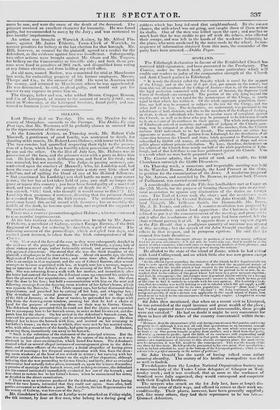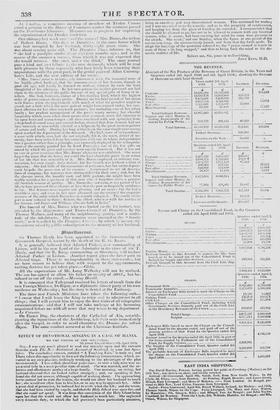SCOTLAND.
The Edinburgh declaration in favour of the Established Chute): has received 4243 signatures, and been presented to the Presbytery. The Courier, under its Scotch head, gives some particulars which tsci"2 enable our readers to judee of the comparative strength of the Cher& and Anti-Church parties in Edinburgh.
" It is only the district called the Royalty which is taxed for the Rapport
of the Clergy, and at the rate of 6 per cent. per annum on the rental; beet from this tax all members of the College of Justice—that is, all the memtier.ace the legal profession connected with the Court of Session, the Supreme COO Court of Scotland—are exempted. The portion of the city lying beyond time royalty, and which is not taxed for the maintenance of the Clergy, is eaniai equal to that which lies within it. Of the whole aggregate population, there- fore, one half may be assumed as subject to the tax for the Clergy, and tne other. half to be free. The declaration, we understand, was presented tc fiat- inhabitants of both districts, and also to the members of the College of Jr...rizz_ in short, to those individuals who have no secular cause of complaint agment: the Church, as well as to those who may be presumed to be lukewarm friviela to it, on aecount of its costliness to their purses. The whole male popuistios. of Edinburgh arrived at maturity, and capable of judging of the Church tideF• tion may be estimated at about 05,000. Of this number, then, the Clionele reckons 424:3 individuals to be her friends. 'Flue remainder are either her opponents or neutrals. The petition front Edinburgh for the dissolution of a connection between the Church and State, lately presented to Parliament, was subscribed by 12,000 odd 11■11111eS, all voluntarily adhibited at shops and xttl'ser public places without private solicitation. We have, therefore, declaratione the subject of the Church from nearly onehalf of the adult population of Edin- burgh, and of that half three to one have petitioned against the Church- is a result which we were hardly prepared to expect." The Courier admits that in point of rank and wealth, the 4242 Churchmen outweigh die 12,000 Dissenters.
On Thursday week, a numerous and respectable meeting was liehl in the Waterloo Rooms, Edinburgh, the Lord Provost in the to petition for the emancipation of the Jews. A resolution prepeoad It)' Mr. Aytoun, and seconded by Dr. Browne, to petition both iloeses of Parliament, was carried unanimously.
A considerable number of the Fife Ake landholders met at Cutter ors
the L.:7th :March, for the purpose of forming themselves into an agricie. tural association to oppose any diminution of the duties on te.--csoes- elan. The Earl of Leven took the chair ; amid the reselotiou.s, moved and seeonded by General Balfour, Sir John Oswald, Mr. L\ to land Makgill, Mr. Gillespie Smith, the Honourable Mr. Breve., Mr. J. B. Fernie, and others. A counter-resolution was propeses! by Major Anstrittlier, timidst loud opposition the Chairman, tello had refused to put it at the commencement of the meeting, and prone-.sr ta put it after the resolutions of his own party had been carried. left. the
chair without putting it at all. It appears from a very co-f..trett; ;,*.■44trt, nt the File Herald, that a prodigious quantity of nonsense was uttered at this meeting ; but the speech of Sir John Oswald excelled al! the others in that respect, and in pompous egotism. He said the. Le scouted free trade theories-
" A ;:reat country like this ought always to produce, at least vary nearly, suffeciere food tor its own subsistence : if it did not, lie could only say, that it would be at the mercy of other (mutinies. who could raise cr depress our markets Z■t their pleasure, ma that we would soon become a second-rate power among the nations.''
He alluded to the state of the island of Zante, which he had vieltesl with Lord Collingwood, and on which little else was now grown except the currant-grape-
- in his official report regarding the statistics of the island, be felt it particulsrt his duty to note specilkally this eiremnstance. He described the magnificent nature of the produce, and the wealth which it hatl created to the islanders; and although be was not then a great political economist, neither thu he pretend to he so now, be re- marked, that in the culture of this plant wheat had been in a great measure espeHed; and that, in consequence, the inhabitants were dependent almost entirely on a tOreigit supply. Ile well recollected Lord Collingwood's answer to him, which lie was proud at the time to fintl it entirely to coincide with his own opinion. His Lordship's cepty was, tltat no country was worth holding or safe to inhabit Width did not sapii!. a suffi- ciency of the necessaries of lit**, fin its own population. (ems " Hear, hear!" aid taught, r, dating which some one cried out "lie/land,") Sir John continued, With great pomp and gravity, if such a dictum was applicable to the small island of Zanic, haw much more so was it to the circumstances of this mighty empire. (Laughter is steer& parts of the room.)" Sir John then mentioned, that when on a recent visit to Liverpotif„ he was astonished at the rapid increase and great wealth of the place 7 but "what appeared most extraordinary and unreasonable, these people were riot satisfied." He had no doubt it might be very convenient for them to have all the riches of the country concentrated within them- selves— " i le knew, from the circumstance o f his wife having conneirions in that quarter, and harass property th, re, although it was now all sold, that speculations to an enormous 4:7110:1211 had been entered MM. When in Liverpool last year. he saw whole acres set apar; be built o! Otte person bought property from another, and a third from that kat', all ri'ah. g enormcus profits, upon the faith of its commerce still augmenting uatall things. he believed. had at length attained to that pitch, that unless there was some as- surance of a continuance of increase to this already overgrown place, the most eaten- OW bankruptcies, it was felt, would be the consequence. This was the reason of Ike cry there for free trade. Ile felt perfectly persuaded in his own mind, that speculatira, such as he had adverted to, were at the bottom of the Liverpool petition ; Ithich he cam- siderea to be a perfect anomaly in the nature if petitions."
Sir John Oswald licis the merit of having talked some rather amusing absurdity. The oratory of his brother monopolists was doll as well as foolish.
Two delegates from the London National Organization Society met a numerous body of the Trades Union delegates of Glasgow on Wed- nesday week ; and it was resolved, that as soon as the workmen of Scotland were fully organized, they would correspond and cooperate with their English brethren.
The sawyers who struck on the 1st July last, have at length dis- covered the error of their ways' and offered to return to their work un-
conditionally. Their places, however, have been generally supplied; and, like many others, they find their repentance to be too late.-- creenock Advertiser,
i Inaba., a numerous meeting of rrieiiibt N of TriOICS rItiODS voted a petition to the f louse of Commons against the sentence passed on the I hueliester laboorers. NIcasures are in progress for improviog
die organization of the I hamlet, %Turkmen. • Our obituary last wock cow Leal the nallle of Mrs. Burns, the widow of Robert Burns. She di% . i Ihnotr,es, in the same house which was last occupied by her loi.liand, thirty-eight years since. She was about seventy years old. The Danyi.nv Times informs us, that " She had a paralytic stroke about t ightt en months ago ; and in the course of the summer a seemei, from which it was not expected that she w.ould recover. She sunk under the third." The same journal
pays a kind and it trilott:! DOW deceased ' • which will be read with pleasure by those especially. who have lately been renewing their acquaintance with tl.e great poet, in the genial pages of Allan Cunning- ham's Life, and tlw tole edition of his works.
"Mrs. Barns' name is so interwoven u itIi the immortal verse of her highly-gifted husbinal, that the announevment if her decease, though in good old age, will hardly be listened to without interest by even the least thoughtful of his admire's. In her own person she neither possessed nor laid claim to the attention of the public because of any special gifts of fancy or in tellect She had, however, claims of a less dazzling kind, which tlw highest order of genius cannot always prefer. During the too brief pen hid of her union with Burns, when she experienced. with winch of what the proudest might be proud, not a little which the most patient might have repined under, her ma- mma affection for her often way Wald partner ; her unabating care of her infinit family ; her prudent management of the poet's scanty means ; her cheerful hospitality which, even when those watts were scantitst, never did iMustice to his open heart and warm temper- -all these coinbined with and springing from a deep fund of sound seo.e and correct feeling showed that Jean Armour had not been unwisely or unworthily selected as a helpmate by the great modern painter of nature and truth. During her long widowhood, the sante simple unassuming spirit marked the depot totem of the deceased. I lee high sense of independence, a sense with %vhich, even had she not originally felt it, she must, almost of ne-
cessity, have been imbued ft her connexion Neith 011e to whom independenee
a passion rather than a principle, was eminently displayed in the iii j iiuish- meet of the annuity granted her by Lord Pan tome ; one of the few gilts on record by which the giver and receiver were equally !unman ed. But it was not (in tare or great occasions that Mrs. Burns. chat auter was exhibited. She never forg‘t the name that she bore ; nor could the least charitable point to an action of her life that was unworthy of it. Mrs. Bums employed, iu ordinary con- versation, her own simple 1101 :1! 111,1100. hut her Scotch was without it taint of vulgarity. She hail little of the eelemonies of politeness, but her entire deport-





















 Previous page
Previous page